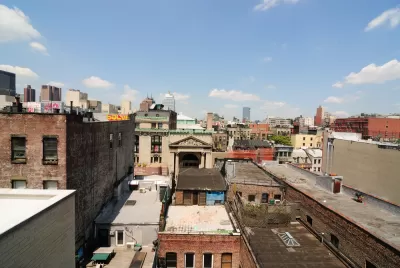A new exhibit at the New York Museum of Modern Art examines the growing pains of urbanism's ascendance.

The new exhibit, opening on November 22 at the Museum of Modern Art, focuses the problems and potential solutions for six different cities around the world: New York City, Mumbai, Hong Kong, Lagos, Rio de Janeiro, and Istanbul. For the exhibit, curator Pedro Gadanho assigned two architectural firms to each city, and required them to present an issue and examine a respective solution.
As Brad Dale of Next City writes: "Two of the cities’ presentations, Mumbai and New York City, exhibited notable parallels, with the solutions grappling with everything from a lack of space to legal issues. In New York, SITU Studio and Cohabitation Strategies investigated the housing crisis in New York City. SITU focused in particular on the invisible New York. New York has a reputation for high-priced real estate, and anyone who’s ever visited likely has wondered, where does the guy who’s selling me pizza live?"
To answer this question, Bradley Samuels of SITU looked into illegal conversions of homes, specifically through 311 calls regarding illegal cohabitation. As Dale writes, "SITU looked beyond the numbers with qualitative work by going with trusted community organizations to see life inside these conversions. About a third of the New York section of “Uneven Growth” is devoted to photographs and diagrams showing ideas for fitting two or three families into a space built for one."
The solution for New York City's conversions? The expansion of "how transferrable development rights can be traded so that low-density neighborhoods could sell air rights one neighborhood over. As the revenue from those sales is converted into additional amenities, and spaces are added to roofs and backyards with modular and DIY structures, SITU sees a public byway extending above and behind homes as well."
FULL STORY: Architecture Ideas for Coping With the Urban Boom in 6 Cities

Planetizen Federal Action Tracker
A weekly monitor of how Trump’s orders and actions are impacting planners and planning in America.

Map: Where Senate Republicans Want to Sell Your Public Lands
For public land advocates, the Senate Republicans’ proposal to sell millions of acres of public land in the West is “the biggest fight of their careers.”

Restaurant Patios Were a Pandemic Win — Why Were They so Hard to Keep?
Social distancing requirements and changes in travel patterns prompted cities to pilot new uses for street and sidewalk space. Then it got complicated.

Platform Pilsner: Vancouver Transit Agency Releases... a Beer?
TransLink will receive a portion of every sale of the four-pack.

Toronto Weighs Cheaper Transit, Parking Hikes for Major Events
Special event rates would take effect during large festivals, sports games and concerts to ‘discourage driving, manage congestion and free up space for transit.”

Berlin to Consider Car-Free Zone Larger Than Manhattan
The area bound by the 22-mile Ringbahn would still allow 12 uses of a private automobile per year per person, and several other exemptions.
Urban Design for Planners 1: Software Tools
This six-course series explores essential urban design concepts using open source software and equips planners with the tools they need to participate fully in the urban design process.
Planning for Universal Design
Learn the tools for implementing Universal Design in planning regulations.
Heyer Gruel & Associates PA
JM Goldson LLC
Custer County Colorado
City of Camden Redevelopment Agency
City of Astoria
Transportation Research & Education Center (TREC) at Portland State University
Camden Redevelopment Agency
City of Claremont
Municipality of Princeton (NJ)





























